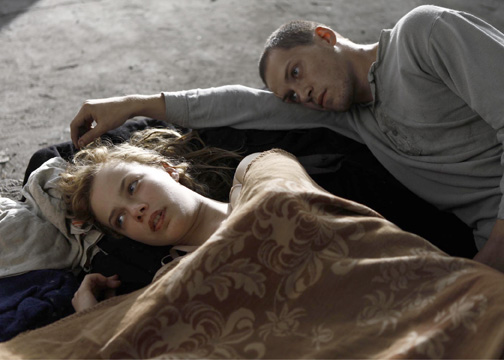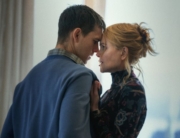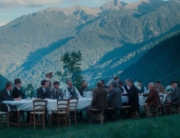
Saskia Rosendahl and Kai Malina in LORE (Music Box Films)
![]() In a spring night in 1945, a large, blonde German family sleeps in a comfortable Bavarian house full of Nazi paraphernalia, until their distraught SS-uniformed father wakes them. Instead of sacrificing his look-alike brood, like Goebbels did in Hitler’s bunker, he and his wife rush to hide their five children deeper in the hinterland, but they have to abandon them as first one parent, and then the other, is apprehended by the allied occupation.
In a spring night in 1945, a large, blonde German family sleeps in a comfortable Bavarian house full of Nazi paraphernalia, until their distraught SS-uniformed father wakes them. Instead of sacrificing his look-alike brood, like Goebbels did in Hitler’s bunker, he and his wife rush to hide their five children deeper in the hinterland, but they have to abandon them as first one parent, and then the other, is apprehended by the allied occupation.
The first lie their eldest daughter, 14-year-old Lore (the amazingly mature Saskia Rosendahl), learns to tell is about where her parents are—usually she says they’re dead. As director Cate Shortland accomplished so well in her debut film, Somersault (2004), Lore keeps the point of view on a young independent teenager. But unlike that film, Lore has more to deal with than the fallout from a crumbling family—the only society she’s ever known is falling apart on an apocalyptic scale, overrun by Russians and Americans. In the chaos of the end of the Third Reich, it’s difficult to tell apart the supporters and the persecuted when all seem to be victims, let alone to know who to trust.
Lore is left responsible for her young sister, twin brothers, and baby Peter, with some money, jewelry, and vague directions to their grandmother’s house 500 miles north in Hamburg. Ironically, the trains are no longer running, and they set off on foot through the Black Forest, the progeny of the master race begging for food and shelter from grudging farmers.
In towns, the requirement to receive aid is to line up to look at photographs of the horrors of the concentration camps run by the Nazis. Even as the Germans grumble that the photos all lie, Lore recognizes uniforms, like her father’s, and maybe even his face. In sensitively adapting the central story in Rachel Seiffert’s three-part novel that was inspired by the author’s mother’s childhood in Nazi Germany, Australian director Shortland says she sees parallels with being “the child of perpetrators,” and when these children are joined by a gaunt young man, her film has strong parallels with Nicolas Roeg’s classic outback odyssey Walkabout (1971), where colonial children lost in the wilderness make an uneasy alliance with a native stranger in order to get home.
Thomas (Kai Malina, who in 2009 was one of the spooky conformist children in Michael Haneke’s The White Ribbon) cagily attaches himself to the kids, using the hungry baby to procure food and transport. But just as the siblings start trusting him for assistance and protection, his brutal survival instincts shock and confuse them, exacerbated by his Jewish identification papers and the numbers on his arm. Even more than how the script by Shortland and Robin Mukherjee explicitly heightens Lore’s accusations against Thomas, the young actors, Rosendahl and Malina, ratchet up the tension with volatile chemistry as unpredictable as their fraught circumstances.
Shortland, with Adam Arkapaw’s beautiful cinematography and the fast-paced editing, contemporizes the look and feel of this period to capture an overwhelmed and exhausted teen’s feelings as Lore sifts through the continuing lies and denials of the truths by everyone around her, including Thomas. Shortland leaves tantalizingly open how the shocks will affect these children when they grow up: will they rebel against hypocrisy and become anti-establishment terrorists, as in The Baader Meinhof Complex? More likely, they’ll be like the siblings divided between being driven to expiate or to deny their parents’ crimes, like the conflicted and haunted Nazi descendants seen in two recent documentaries—Harlan: In The Shadow Of Jew Süss and 2 Or 3 Things I Know About Him.






Excellent and comprehensive review, touching the complexities
of this amazing film.
This movie I can’t stop thinking about.. I love this movie…the movie put so many different feeling into me as I watch it……..actors were wonderful..